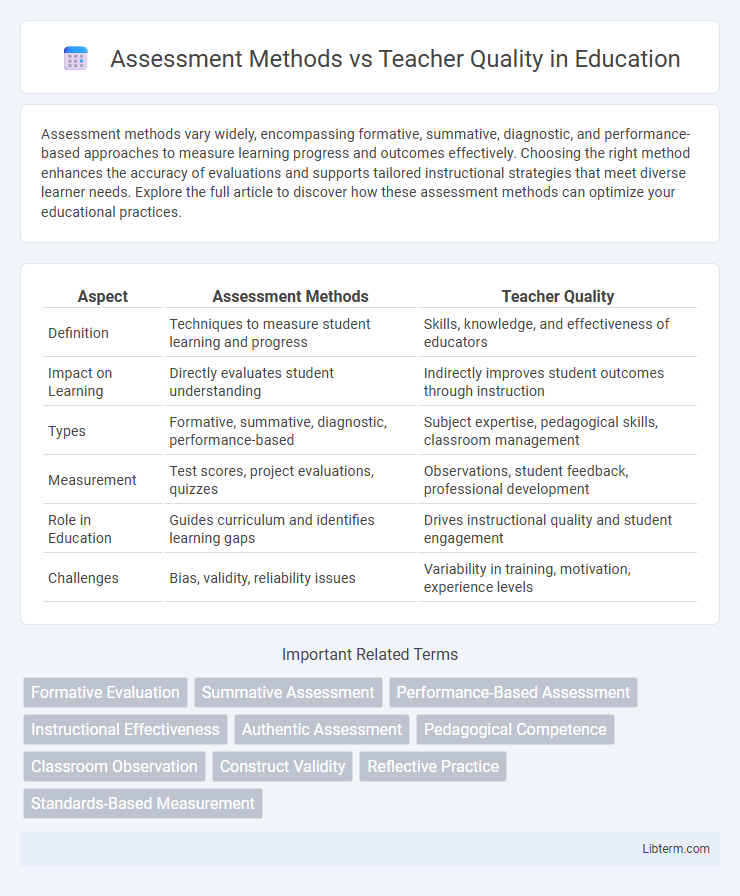Assessment methods vary widely, encompassing formative, summative, diagnostic, and performance-based approaches to measure learning progress and outcomes effectively. Choosing the right method enhances the accuracy of evaluations and supports tailored instructional strategies that meet diverse learner needs. Explore the full article to discover how these assessment methods can optimize your educational practices.
Table of Comparison
| Aspect | Assessment Methods | Teacher Quality |
|---|---|---|
| Definition | Techniques to measure student learning and progress | Skills, knowledge, and effectiveness of educators |
| Impact on Learning | Directly evaluates student understanding | Indirectly improves student outcomes through instruction |
| Types | Formative, summative, diagnostic, performance-based | Subject expertise, pedagogical skills, classroom management |
| Measurement | Test scores, project evaluations, quizzes | Observations, student feedback, professional development |
| Role in Education | Guides curriculum and identifies learning gaps | Drives instructional quality and student engagement |
| Challenges | Bias, validity, reliability issues | Variability in training, motivation, experience levels |
Introduction to Assessment Methods and Teacher Quality
Assessment methods directly impact teacher quality by providing measurable insights into student learning and instructional effectiveness. Diverse evaluation techniques such as formative assessments, summative tests, and performance-based assessments enable educators to refine teaching strategies and enhance professional development. Effective assessment serves as a critical feedback mechanism that drives continuous improvement in teacher performance and student outcomes.
Defining Teacher Quality in Modern Education
Teacher quality in modern education is defined by a combination of subject matter expertise, instructional skills, and the ability to adapt assessment methods to diverse learner needs. Effective assessment methods provide critical feedback that informs teaching strategies, ensuring alignment with educational standards and enhancing student outcomes. Research highlights that continuous professional development in both pedagogy and assessment literacy is essential for maintaining high teacher quality.
Overview of Common Assessment Methods
Common assessment methods include formative assessments, summative assessments, and performance-based evaluations, each playing a crucial role in measuring student learning and instructional effectiveness. Formative assessments provide real-time feedback, enabling teachers to adjust their teaching strategies to meet student needs, while summative assessments evaluate overall learning outcomes at the end of instructional periods. Performance-based assessments assess students' ability to apply skills in practical contexts, offering insights into both student understanding and teacher effectiveness in fostering critical thinking and problem-solving abilities.
The Relationship Between Assessment Practices and Teacher Performance
Effective assessment methods provide teachers with critical insights into student learning, directly influencing teacher performance and instructional strategies. Data-driven assessment practices enable educators to identify strengths and weaknesses, facilitating targeted interventions and continuous professional growth. Research demonstrates a strong correlation between the quality of assessment tools and improvements in teacher effectiveness and student outcomes.
Evaluating Teacher Quality: Traditional vs Innovative Approaches
Evaluating teacher quality involves traditional assessment methods such as classroom observations, standardized test scores, and student evaluations, which focus on measurable outcomes and direct instructional effectiveness. Innovative approaches incorporate peer reviews, video analysis, and data-driven feedback systems that emphasize continuous professional development and adapt to diverse learning environments. Combining these methods enhances the reliability and validity of teacher evaluations, supporting targeted improvements in teaching practices.
Impact of Assessment Methods on Teacher Development
Assessment methods play a crucial role in shaping teacher development by providing targeted feedback that highlights instructional strengths and areas for improvement. Formative assessments, such as peer reviews and classroom observations, foster reflective teaching practices and encourage ongoing professional growth. Well-designed assessment tools align with teacher competencies, enabling tailored training programs that enhance instructional effectiveness and student outcomes.
Challenges in Measuring Teacher Quality Through Assessments
Measuring teacher quality through assessments presents significant challenges due to the multifaceted nature of teaching, which includes classroom management, student engagement, and instructional strategies that standard tests may not capture. Assessment methods often rely heavily on student test scores, which can be influenced by external factors such as socioeconomic status, making it difficult to isolate the teacher's true impact. Furthermore, standardized assessments frequently fail to account for subject-specific skills and the diverse learning needs of students, limiting their effectiveness as comprehensive measures of teacher quality.
Best Practices for Aligning Assessment with Teacher Quality
Effective alignment of assessment methods with teacher quality enhances instructional impact and student outcomes. Utilizing formative assessments allows teachers to adapt instruction based on real-time data, promoting reflective practice and professional growth. Best practices include training educators in data literacy and ensuring assessments measure both content knowledge and pedagogical skills to maintain high teaching standards.
Case Studies: Effective Assessment Methods and Teacher Outcomes
Case studies reveal that effective assessment methods, such as formative assessments and performance-based evaluations, significantly enhance teacher quality by providing actionable feedback that informs instructional strategies. In diverse educational settings, teachers who implement regular, data-driven assessments demonstrate improved student engagement and achievement, reflecting higher teaching effectiveness. These studies underscore a strong correlation between systematic assessment approaches and positive teacher outcomes, emphasizing the role of assessment in professional development and instructional improvement.
Future Trends in Assessment and Teacher Quality Enhancement
Future trends in assessment emphasize adaptive, technology-driven evaluations that provide real-time insights into student learning, enhancing personalized instruction. Teacher quality improvement increasingly integrates data analytics and continuous professional development platforms, enabling targeted skill enhancement and reflective practice. The convergence of innovative assessment tools and teacher quality initiatives fosters a dynamic educational environment focused on measurable outcomes and sustained educator growth.
Assessment Methods Infographic

 libterm.com
libterm.com